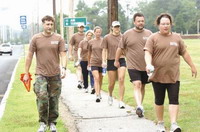Jury selection in case of youth death at Florida boot camp is in full swing
Martin Lee Anderson was one of the troubled teens who got into a Panama City military-style boot camp. A grainy camp surveillance tape showed him being struck repeatedly by guards and collapsing as a nurse watched. The 14-year-old was carried off on a stretcher and died the next day.

On Monday, prosecutors and defense attorneys are set to begin selecting the six jurors and four alternates who will decide the case of seven guards and a nurse accused of aggravated manslaughter of a child in Anderson's death in January 2006.
Anderson's death led the Florida legislature to abolish the military-style boot camps for juvenile offenders last year. Under legislation signed in May by Gov. Charlie Crist, Anderson's parents were given $5 million in compensation from the state for their son's death, and the Bay County sheriff's office has separately settled with the Anderson family for $2.4 million.
The case has gotten so much media attention locally that more than 1,400 Bay County residents - or one of every 90 adults - have been called to the Panama City Marina Civic Center in an attempt to find an impartial jury. If not, the trial will have to be moved to another Florida county.
"I can think of lots of trials where 300, 400 or 500 potential jurors were called but I cannot think of one with 1,400 - that's somewhat unprecedented," said Philip K. Anthony, chief executive officer of Decision Quest, a national jury consulting firm.
But Anthony, whose company has consulted in more than 15,000 trials, predicted a local jury will eventually be seated .
"It always amazes me the people you ultimately find who know absolutely nothing about an issue," he said.
Anderson was sent to the camp for a probation violation - he trespassed at a school after he and his cousins were charged with stealing their grandmother's car from a church parking lot.
During his first hours at the camp, which has since been closed, Anderson became lethargic during a physical fitness test. An exercise yard videotape shows the guards using their fists and knees to repeatedly take Anderson to the ground and then holding ammonia capsules under his nose. The camp nurse, Kristin Schmidt, watched and did nothing during most of the 30-minute encounter with the seven men. The teen died the next day - Jan. 6, 2006.
The original autopsy, conducted by the Bay County medical examiner, said Anderson's death was caused by natural complications of sickle cell trait, a genetic blood disorder. After an outcry from Anderson's family and the public, his body was exhumed and a second autopsy by another doctor found the guards suffocated him.
The defense will lean heavily on the first autopsy, saying it shows the guards' and nurse's actions were not to blame. Former Florida Gov. Jeb Bush appointed Hillsborough County State Attorney Mark Ober to investigate and prosecute the case, citing a potential conflict of interest for local prosecutors. His team will say that the second autopsy combined with the video shows that Anderson was killed.
Most jurors will have some knowledge of the video, which received national attention after it was released last year, said Waylon Graham who represents Charles Helms Jr., the ranking camp guard on duty the day Anderson entered the camp.
But he said defense attorneys will show jurors the video frame by frame, over and over, to mitigate its emotional impact.
And Graham said his client and the other guards will likely testify during the trial.
"We will be watching that videotape enough to make everyone real tired and real bored," he said.
"I'm sure my client will be testifying. All of the defendants are eager to explain what happened," he said.
Circuit Judge Michael Overstreet has set a tight schedule for trial, with opening statements set for Oct. 3. He told attorneys at a conference on Wednesday that he expected the case to be finished by Oct. 8.
Despite the judge's efforts to keep the massive trial on schedule and to seat a jury, some outside observers predicted the trial would eventually be moved outside of Bay County.
"It's going to be pretty darn hard to seat a jury," said Jeffrey Harris, a Fort Lauderdale attorney and president-elect of the Florida Association of Criminal Defense Lawyers. "The judge is obviously doing everything he can by calling 1,400 people, that's extremely unusual. This case has had so much publicity that is really like no other.
"Sometimes a trial just has to be moved."
Subscribe to Pravda.Ru Telegram channel, Facebook, RSS!


